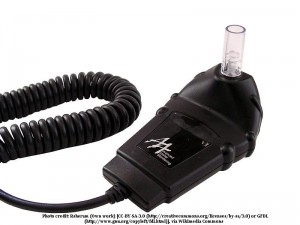Florida DUI Laws and the Ignition Interlock Device
Florida really seems to be one of the most forgiving states in the union when it comes to driving violations. Even those drivers with multiple DUIs can, under the right circumstances, receive special restricted rights such as hardship licenses, which allow them to drive only to and from work. In 2002, the state of Florida also initiated the Ignition Interlock Program (IIP) as a practical and innovative way to cut down on the rate of repeat drunk driving offenses. Florida drivers ordered to use an ignition interlock device will be given a special license labeled with a “P” restriction.
How Does an Ignition Interlock Device Work?
The ignition interlock device (IID) works by requiring a breathalyzer sample from the driver of the car before it will allow them to start the vehicle. If the blood alcohol content (BAC) of the driver is above .05, the car will not start. Random breath samples are also taken while the car is being operated to continuously monitor the driver’s BAC and keep the roads safe. Attempting to bypass or disable the system in any way may result in strict legal penalties and a complete loss of driving privileges.
If the device records a reading over the limit while the car is in use, it will activate an alarm system to bring the driver’s attention to the reading and make them stop the car. All readings are recorded on a computer chip inside the IID and can be downloaded by law enforcement to make sure the driver has been abiding by the law. If your IID records an illegal reading… watch out! You might just have all your driving privileges taken away permanently.
Who Needs an Ignition Interlock Device?
Whether or not and for how long the state will require you to use an ignition interlock device on your car depends upon how many DUIs you have and how high over the legal limit you were with your blood alcohol content. First-time offenders may get off without needing an IID, unless their BAC was over .15 or they had a minor in the car;, in which case an IID will be required for at least 6 months. A 2nd offense will warrant a 1- or 2- year sentence, and by the 4th offense the guilty driver will be facing at least 4 years of driving with an IID. The courts will also most likely order the driver to complete the Florida Advanced Driver Improvement Course (ADI) before being allowed to drive again.
The user of an IID typically pays $72-160 to have it installed, plus an additional monthly fee of about $70 for regular maintenance and calibration. These are small prices to pay to be able to keep driving after a DUI, as the alternative is to lose your license completely in these cases. The ignition interlock program was designed so that Florida drivers could make amends for their mistakes and continue to enjoy the luxury of driving without endangering other people. Though there is some controversy regarding whether or not it is logical or fair to penalize drivers who were only one sip of alcohol over the limit with the same punishment as those who were more than double the legal limit, it appears that IIDs will be a regular part of DUI prevention for the foreseeable future.






